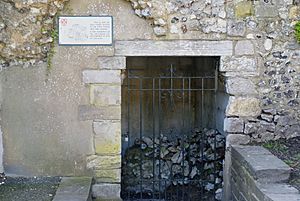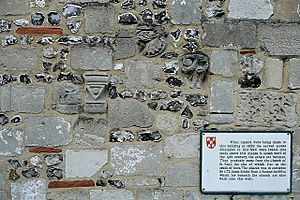Venta Belgarum facts for kids
Venta Belgarum was a town in the Roman province of Britannia Superior, the civitas capital of the local tribe, the Belgae, and which later became the city of Winchester.
Etymology
The name is Celtic in origin: Venta comes from *Uentā, a common Native British word meaning "market". Romans writers recorded the town as Venta Belgarum (The Venta of the Belgae) to distinguish it from the other tribal markets in Britain such as Venta Silurum and Venta Icenorum.
Religion
The forum-basilica appears to have included a temple to Jupiter, Juno and Minerva along with an accompanying Jupiter Column. Elsewhere, there was a Romano-British style temple dedicated to the Celtic horse goddess, Epona. There was a large Romano-British cemetery to the north of the town, at Lankhills, and another to the east. Excavations of the cemetery were carried out by British archaeologist Julian Richards in 1998, and again in 2013, as part of the BBC television Meet the Ancestors series.
Decline
From the mid-4th century, new development at Venta halted. Houses fell into disrepair and the drainage system collapsed. The population concentrated itself in the higher and drier areas of the town. The defences were however strengthened and the cemeteries remained in use, notably with burials of males wearing so-called military-style mercenary belts. Historian David Nash Ford identifies the community as the Cair Guinntguic ("Fort Venta") listed by Nennius among the 28 cities of Britain in his History of the Britains.
Following the Roman withdrawal from Britain in 410, urban life seems to have ceased around 450, although a small administrative centre might have continued after that on the site of the later Anglo-Saxon palace. Amid the Saxon invasions of Britain, cemeteries dating to the 6th and 7th centuries suggest a revival of settlement and Wintanceastre became the usual court for the kings of Wessex, and then for other Saxon, Danish, and Norman kings of England.



